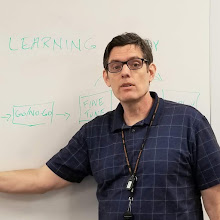As an enthusiastic young evangelical decades ago, I devoured the scientific creationism literature written by the likes of Duane Gish and Henry Morris. Did you know that, based on the erosion rate of silicon, it only took 8000 years for the oceans to reach their current concentration of silicon? So how could the earth be billions of years old? I filled my mind with dozens of such factoids, held intense debates with my atheist friend Shawn, and scoffed at unbelieving scientists.
Then I entered the Ivy League, where respect for the scientific enterprise flowed like a deep, irresistible current. As it carried me along, I felt like I had to abandon my Christian faith or drown. The scientific consensus was that the earth was indeed billions of years old, but the Bible taught that the earth was less than 7000 years old. I had to choose between the two...and I chose science.
I considered myself to be an agnostic, I guess because I didn't want to adopt the label of atheist and give up all hope of ever rediscovering faith. I was adrift; just what was life supposed to be about anyway? If everything boils down to baryons and the forces of physics, then there is no free will, no design, no purpose.
I resolved one evening that I must nevertheless live a life of love. But this left me with a terrible problem: how was I to accomplish that? I was no saint, nowhere close. In fact, I would have to describe the 19 year old Chris Falter as just another selfish, arrogant Ivy Leaguer hungry for success. I gazed up at the stars in anguish, looking for an answer. Suddenly a vision of Jesus on the cross came to me. The message was unmistakable: Jesus demonstrated how to love truly when he offered his life on that cross. If I wanted to love others, I had to follow Jesus. With newfound hope I prayed, "Lord, if you're really there, make your power and love known in my life!"
I re-embarked on the journey of faith, eager to resolve the bitter dispute between faith and science. Dr. John Suppe, an astonishingly gifted geologist, was acting as a mentor to many Christian students at Princeton. He didn't openly repudiate the "scientific creationists," but the theory of plate tectonics that he was helping to develop clearly could not be squared with an 8000 year old earth. I began to believe that the word of God and the works of God did not have to contradict. Then my dear friend Jerry Roth, a Christian student in geology, pushed me over the line one day by talking about some field studies he had participated in. His team had drilled into a mountain to obtain rock samples, and dated them by the potassium-argon method. Sure enough, the deeper the samples, the older the dates, just as predicted. And yes, the dates were in the tens of millions of years.
So Dr. Suppe and Jerry showed me that I could be a Christian of both deep faith and scientific rigor; I didn't have to choose between the heart and the mind. (Indeed, Jesus commanded us to love the Lord our God with all our minds as well as with all our hearts.) From the writings of Hugh Ross, I discovered that the use of the word "day" in Genesis can also mean "era" in the original Hebrew. Thus, we are not tied to a 168-hour interpretation of the creation account. This exegesis is supported by Hebrews 4: 7, which indicates that the seventh day of Creation continues as the present age of grace--a "day of rest" that we enter by faith in Christ.
I also came to realize that the so-called scientific evidence that Gish, Morris, and others in scientific creationist camp had cited was completely in error. For example, silicon does not just erode into the ocean; it also leaves through a process called efflux. Once we take efflux into account, we see that the silicon concentration in ocean water is in equilibrium. So oceanic silicon actually supports the view that the oceans are billions of years old, and contradicts the view that they are only a few thousand years old. I will review some of the other young-earth creationist "evidence" in another post, hopefully very soon.
For now, I just want to leave you with this thought: if you are a Christian parent, why should you expose your child to the danger that he or she will read the scientific literature and conclude that the Biblical account of creation is just wrong--and that the Bible must therefore be wrong? If you are a pastor, why should you expose your flock to this danger? How I wish that a pastor had taught me the day-age view of Genesis 1 - 3 in my youth! I could have been spared a lot of darkness, despair, grief, and emptiness.
Please, please, please: spare our children the darkness that I experienced! Teach them that they can explore the whole body of scientific evidence with an intellectual integrity that befits someone who desires integrity in every area of life. Teach them that the scientific enterprise and the Bible do *not* contradict, because a reasonable exegesis of Genesis points not only to an ancient universe, but also to a God who is pleased to reveal Himself both through personal encounter and through His creation.
[Thanks to my editor, the beautiful Linda Falter, for her help with this post.]
Monday, November 2, 2009
Subscribe to:
Comments (Atom)
